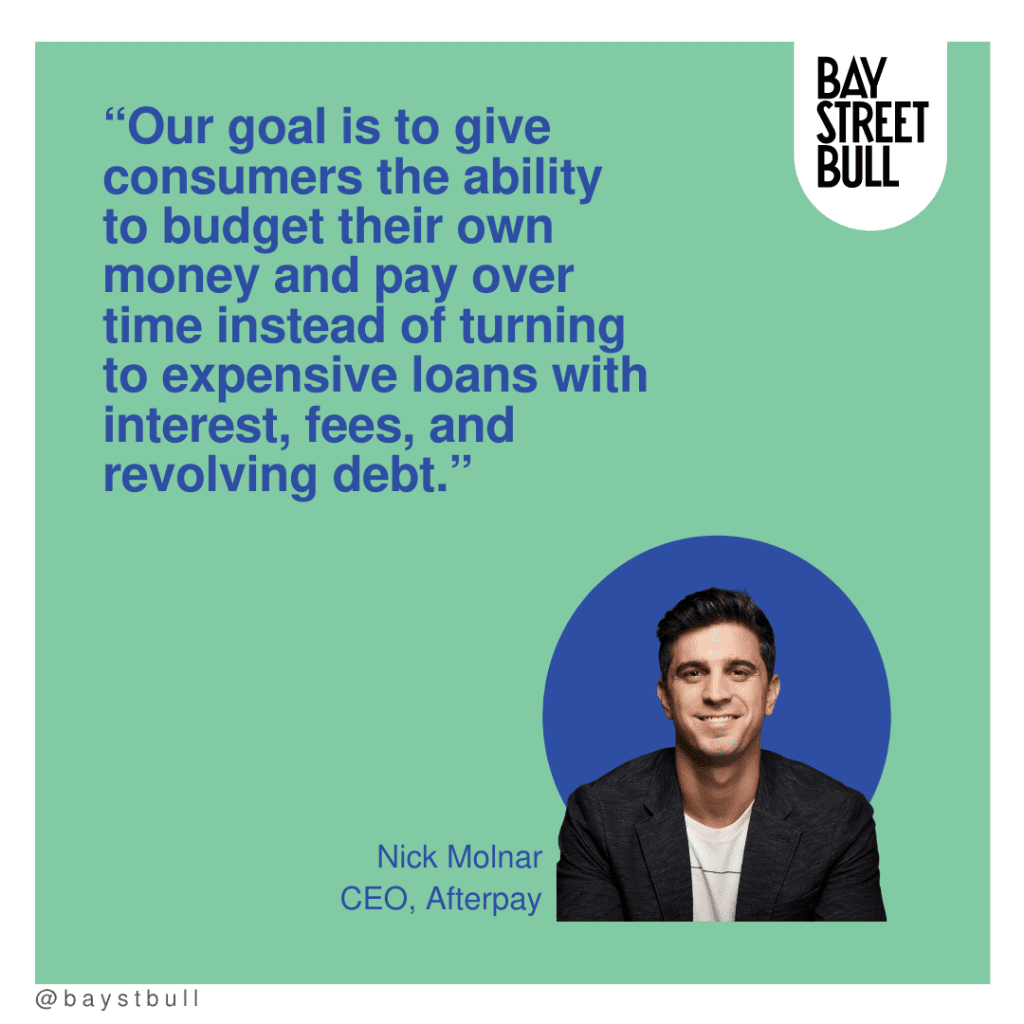Founded by Nick Molnar and Anthony Eisen, Afterpay is a fintech startup built on the “buy now, pay later” model. Their business strategy is one that comes at an opportune time as digital commerce continues to rapidly grow. For them, Afterpay’s thesis is simple: empower companies by driving their online business growth, and consumers by allowing them to access their favourite products without incurring debt or compounding interest.
While Millennials may be better educated and more economically active than previous generations, financial stability remains a big concern. In fact, in a recent study conducted by PwC and The Global Financial Literacy Excellence Center, research found that 34 percent of those surveyed were unsatisfied with their current financial situation, while 18 percent reported not being satisfied at all. And according to the Lincoln Financial Group, 89 percent of Gen Z stated that planning for their financial future makes them feel empowered. It’s clear that money is top of mind for both Millennials and Gen Z.
Since its launch in 2014, Afterpay has grown into a global company, expanding into Canada and surpassing five million active users in the US market in 2020 alone. Below, Molnar discusses how (and why) he built Afterpay, and why he’s excited for the future of digital commerce.
Bay Street Bull: You used to play rugby semi-professionally in Australia. What did you learn about teamwork and communication from that experience that you have translated into building your business?
Nick Molnar: Playing rugby taught me the importance of teamwork and how to build perseverance. There are many correlations between building a company and being an athlete. There are obstacles to overcome, and cases of failure that you need to learn and grow from in order to move forward. Giving my all to a competitive sport, and the daily training that went with it, taught me the importance of grit and tenacity.
Bay Street Bull: What has been the most valuable experience that has contributed to your path of entrepreneurship?
Nick Molnar: The work I did with my family’s business. I grew up helping my parents with their own jewelry business, which taught me [about the] hard work and dedication required for running your own company.
Once I was in college, I sold jewelry online for the first time. I started with a few pieces and then quickly grew to become the number-one seller of jewelry on eBay Australia. Ultimately, I helped reinvent the way people shopped for jewelry by bringing it online and extending access to people all across the country. Then and now, I see innovation as central to delivering on customer needs and scaling a business.
Bay Street Bull: What spurred the idea of Afterpay? Why did you decide to build a company like this?
Nick Molnar: I founded Afterpay six years ago with my partner Anthony Eisen to support Millennials who prefer to spend their money responsibly—avoiding expensive credit and instead, using their own money to pay over time. This was a key lesson learned by many of my Millennial friends and myself after the 2008 financial crisis
Today, there is an obvious acceleration in online spending but there is also the tangible shift away from credit cards, just like in 2008. Millennials and Gen Z are demonstrating a clear aversion to financial risk, especially for lifestyle purchases.
Our goal is to give consumers the ability to budget their own money and pay over time instead of turning to expensive loans with interest, fees, and revolving debt.


Bay Street Bull: How does Afterpay work?
Nick Molnar: Afterpay allows customers to receive products immediately and pay for their purchases over four installments, interest-free. Merchants pay a small transaction fee to Afterpay for the service.
Afterpay is not a loan. There are no hard or soft credit checks, interest, or the ability to revolve into debt. If one payment is missed, the customer can’t use our service until the payment is made.
With this approach, we turn the credit card model on its head. Credit cards and traditional credit products make significant profits from a customer’s inability to make a full payment, which leads consumers down the rabbit hole of debt.
Bay Street Bull: What is your philosophy on money and personal finance?
Nick Molnar: My partner Anthony and I founded Afterpay with the belief in fairness and financial freedom for all. When we created Afterpay, we wanted to offer consumers a responsible way to budget their spending without having to worry about the cycle of debt. Our mission is to build an economy in which everyone wins.
RELATED: How Wealthsimple CEO Michael Katchen Humanized Our Relationship with Money
Bay Street Bull: How does a company like Afterpay, which focuses on retail installment payments, empower businesses and consumers?
Nick Molnar: Afterpay connects retailers with young and highly engaged shoppers who prefer to use their own money over time. Afterpay’s customers are primarily Millennial and Gen Z—frequent shoppers with spending power who are also repeat, loyal Afterpay customers.
Afterpay pays retailers the full amount upfront for purchases, while the customer pays Afterpay directly over time, taking on the full risk of repayment. Our retailer partners report gaining new customers, bigger order value (by 40 percent on average), higher conversion (22 percent increase in cart conversion and more repeat shoppers), and fewer returns.


Bay Street Bull: What do you think are the biggest misconceptions or hesitations around the “buy now, pay later” model?
Nick Molnar: Afterpay turns the credit model on its head. We aren’t a loan, don’t charge interest, or let a consumer revolve into the rabbit hole of debt. We never perform credit checks or try to “upsell” with interest-bearing products.
While we sometimes get asked if there is a “catch,” our business is a win-win. Our most engaged and loyal customers love us for that reason—we allow them to budget and achieve financial wellness.
RELATED: Livescale Brings E-Commerce Into the Future by Looking to the Past
Bay Street Bull: How do you think the changing e-commerce landscape will correlate with Afterpay’s role in the marketplace?
Nick Molnar: During this pandemic, not only have we seen an acceleration in online spending, but we’ve also seen a significant shift to debit card usage especially among Millennial and Gen Z consumers who demonstrate a clear aversion to financial risk. Afterpay’s data has shown a significant shift to debit over the COVID-19 period, beginning in March. Now, nearly 90 percent of transactions are paid with debit cards over time. Afterpay has benefited from these current trends in e-commerce, and we’ve expanded our merchant and customer base in the process.
In Canada specifically, leading fashion brands like Aritzia and RYU have recently partnered with us to expand their digital offerings to customers and connect with a younger generation of shoppers.
Bay Street Bull: Afterpay has grown into a global brand since you founded it in 2014. What excites you most about the road ahead?
Nick Molnar: The new way to pay is to empower people to use their own money in a responsible and safe way. Financial wellness and budgeting is and will continue to be the way young people want to pay for things in their lives, especially as this generation matures. We are focused on helping to build an economy where everyone wins.
[yikes-mailchimp form=”1″ title=”1″ submit=”SUBSCRIBE”]













